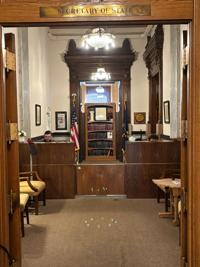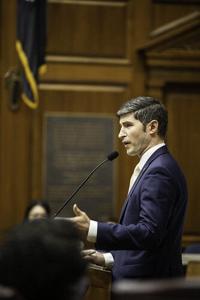-
Indiana Secretary of State Diego Morales and the co-directors of the Indiana Election Division have been given a 90-day notice that litigation may be coming to block that state’s new Citizenship Crosscheck Provision, which is scheduled to take effect July 1. Voting rights groups are warning Indiana Secretary of State Diego Morales and the Indiana Election Division that implementation of a program to verify voter citizenship status using records from the Indiana Bureau of Motor Vehicles violates the National Voter Registration Act as well as the Civil Rights Act and, unless changes are made, could result in litigation.
In a seven-page letter sent Thursday, the groups asserted the BMV Citizenship Crosscheck Provision, which was included in the controversial House Enrolled Act 1264 passed by the Indiana General Assembly last year, is out of compliance with the NVRA because it will impose a requirement on naturalized citizens that is not placed on U.S.-born citizens. Namely, naturalized citizens who are listed by the BMV as having temporary credentials, which mistakenly indicates they are not citizens, will have to provide documentary proof of citizenship to election officials in order to register or remain on the state’s voter rolls.
“As we lay out in the letter, the BMV Citizenship Crosscheck Provision is fundamentally discriminatory, because only naturalized citizens – and not U.S.-born citizens – will ever be erroneously flagged for removal, which the NVRA prohibits,” Ami Gandhi, director of the Midwest Voting Rights Program at the Chicago Lawyers’ Committee for Civil Rights, said. “Our understanding is that it is known that the BMV list of temporary credentials is not accurate as to current citizenship status, and so it is guaranteed to erroneously identify naturalized citizens as potential noncitizens.”
Ami Gandhi. Secretary Morales’ office and election division officials did not respond to a request for comment.
The Citizenship Crosscheck Provision does not take effect until July 1. Gandhi explained the provision, itself, will violate the NVRA if it is activated in about three months, but also, the groups contend the state is currently running afoul of the federal law because of the work it is doing to prepare for the implementation of the program.
In addition, the groups have requested from state election officials a number of records related to the state’s efforts to ensuring only eligible voters are registered to vote. The groups have asked for a copy of the voter rolls, so they can identify voters “who are at risk of harm from the BMV Citizenship Crosscheck Provision.” Also, they want documents that describe how the crosscheck program will be implemented, including the guidance and instructions for verifying eligibility prior to removal.
Gandhi said the advocates are entitled to those records under the requirements of the NVRA.
“We’re eager to learn more. We’re eager to learn if the state is looking to remedy the legal violation,” Gandhi said, noting the groups want to know more about the state’s plan to implement the citizenship crosscheck law. “One of the purposes of this letter is for voters and nonpartisan organizations to gain more information about what the plans are.”
The voter groups have given the state 90 days, which coincides with the July 1 effective date of the new law, to conform with the requirements of the National Voter Registration Act. If the violations are not corrected within 90 days, the groups said in the letter that they “may proceed with litigation and seek declaratory or injunctive relief to remedy the violation.”
Voting advocates: Provision is ‘far-reaching, harmful and unnecessary’
When HEA 1264, authored by Rep. Timothy Wesco, R-Osceola, was being debated during the 2024 legislative session, it drew heavy criticism from voting rights advocates, which caused some Republican senators to withdraw their support of the measure. Julia Vaughn, executive director of Common Cause Indiana, told the House Elections and Apportionment Committee at the time that the state “undoubtedly will be sued over this law should it take effect.”
Rep. Timothy Wesco, R-Osceola. Former Gov. Eric Holcomb signed the bill into law on March 11, 2024.
The BMV crosscheck is one of the provisions in HEA 1264. Under that section of the law, election officials must send a notice to any individual who registered to vote in Indiana and is designated by the Bureau of Motor Vehicles as having the kind of driver’s license, learner’s permit or identification card that is issued to people who are noncitizens but have temporary lawful status. That individual will then have 30 days to provide proof of citizenship to the county voter registration office, which includes a birth certificate or a U.S. passport or U.S. naturalization document. If the individual does not respond or offer the accepted proof of citizenship in time, then the county election office must cancel that person’s voter registration.
In the letter, the voting rights groups asserted the BMV’s database does not accurately or reliably identify which Indiana residents are noncitizens. Individuals who obtain a temporary credential as noncitizens are not required to notify the BMV if they become naturalized citizens of the United States. Often, the groups noted, the individuals will only tell the bureau of their new citizenship status when their temporary credentials expire and they start the process of getting a new driver’s license or identification card.
The groups outlined in their letter the sections of the NVRA that the citizenship crosscheck provision violates. The alleged violations are as follows:
- Imposes the proof-of-citizenship requirement on a “subset of Indiana registrants” that is not mandated on the federal voter registration form;
- Exceeds the limit of information states may require on their own forms from individuals registering to vote in federal elections;
- Discriminates against naturalized citizens by using BMV data to check voter eligibility, which will “erroneously flag only naturalized, and not U.S.-born, citizens”and require them to provide citizenship documentation;
- Risks removing individuals from the voter rolls less than 90 days before a primary or general election, possibly robbing those wrongly removed from the rolls of the time they may need to rectify any errors before voting ends.
Also, the voting groups asserted the Civil Rights Act is violated by HEA 1264’s requirement that naturalized citizens will have to prove their citizenship after they are erroneously flagged by the process of comparing the voter rolls with BMV records. The groups contended proof-of-citizenship requirement violates the Different Practices Provision, “which prohibits applying different standards, practices or procedures for determining voter eligibility to different individuals.”
To bolster their claims, the groups pointed to 2025 ruling in Mi Familia Vota v. Fontes from the 9th U.S. Circuit Court of Appeals. The appellate panel affirmed that a 2022 Arizona law requiring voters to show proof of citizenship when registering to vote in federal elections violated the National Voter Registration Act.
Indiana voting rights groups noted the Citizenship Crosscheck Provision is seeking to address a form of voter fraud that is rare. “Overwhelming evidence” show that noncitizens do not vote or attempt to vote. In addition, Hoosiers registering to vote already must affirm under penalty of perjury that they are U.S. citizens, the groups’ letter stated.
“The BMV Citizenship Crosscheck Provision is one of several far-reaching, harmful, and unnecessary policies that Indiana has advanced or enacted in recent years to address unsubstantiated concerns of non-citizen voting,” the groups said in their letter. “The BMV Citizenship Crosscheck Provision only complicates Indiana’s voting and voter registration procesess to make both less accessible for Indiana voters by creating unnecessary hurdles that only naturalized citizens – and no U.S.-born citizens – have to endure to exercise their right to vote.”
The letter was signed by Common Cause Indiana, League of Women Voters of Indiana, Hoosier Asian American Power, and the NAACP Indiana State Conference. Lawyers representing the groups are from the Chicago Lawyers’ Committee for Civil Rights, Lawyers’ Committee for Civil Rights Under Law and Bowman & Vlink in Indianapolis
This article was published by TheStatehouseFile.com through a partnership with The Indiana Citizen, a nonpartisan, nonprofit platform dedicated to increasing the number of informed, engaged Hoosier citizens.
Indiana Citizen Editor Marilyn Odendahl has spent her journalism career writing for newspapers and magazines in Indiana and Kentucky. She has focused her reporting on business, the law and poverty issues.
Home State News FEATURED ‘Fundamentally discriminatory’: Voting advocates say Indiana’s proof-of-citizenship rule for certain voters...








Have a ID it’s simple to vote ………like you have to do anything else……….Todays demoncrats are racist………
Almost spot on, maybe not racist, but Baizuo’s as a minimum.
Comments are closed.